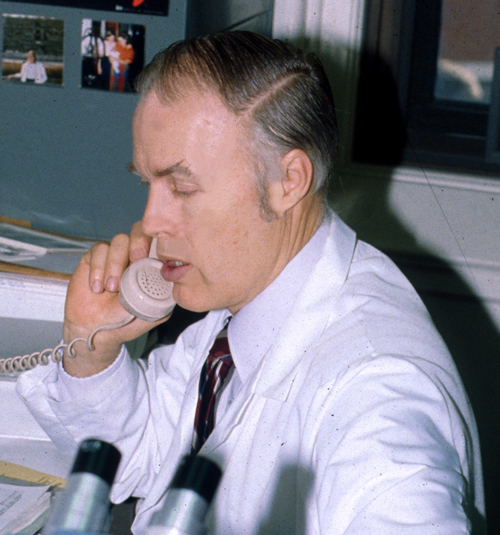Farewell, Dr. Theodore (Ted) Beals 1934-2021
By Lynn McCain | August 26 2021 The Department of Pathology offers its sincere condolences to the family of Dr. Theodore (Ted) Beals, who passed away on August 19, 2021, at the age of 87. Beals was a long-time member of the University of Michigan and the Department of Pathology. He began his academic career as an undergraduate at U-M and went on to obtain a master’s degree from UM Rackham Graduate School in 1961 and graduated from the University of Michigan Medical School in 1966. This was followed by a 1-year internship at University Hospital and a 4-year residency in Pathology. At the completion of his training in 1971, he joined the faculty of the Department of Pathology as an Instructor in Pathology and was appointed as Assistant Chief of the Pathology Service at the Ann Arbor Veteran’s Affairs Hospital (AAVAH). He was promoted to Assistant Professor of Pathology in 1986 and to Chief of Pathology Service at the AAVAH in 1987, where he remained until his retirement in 2001.
The Department of Pathology offers its sincere condolences to the family of Dr. Theodore (Ted) Beals, who passed away on August 19, 2021, at the age of 87. Beals was a long-time member of the University of Michigan and the Department of Pathology. He began his academic career as an undergraduate at U-M and went on to obtain a master’s degree from UM Rackham Graduate School in 1961 and graduated from the University of Michigan Medical School in 1966. This was followed by a 1-year internship at University Hospital and a 4-year residency in Pathology. At the completion of his training in 1971, he joined the faculty of the Department of Pathology as an Instructor in Pathology and was appointed as Assistant Chief of the Pathology Service at the Ann Arbor Veteran’s Affairs Hospital (AAVAH). He was promoted to Assistant Professor of Pathology in 1986 and to Chief of Pathology Service at the AAVAH in 1987, where he remained until his retirement in 2001.
Beals was an expert in electron microscopy and taught classes on the subject at the University of Michigan for several years and mentored residents in their rotations at the AAVAH. He was an avid educator and loved by his students. Dr. Barbara McKenna, Professor Emerita, was one of these residents and fondly recalls her training under him. “He was a wonderful friend and teacher to residents rotating at the VA. He allowed us to use the electron microscope, transmission, and scanning, and then develop the photos in his darkroom. He taught in a very gentle way. He and Lee Weatherbee took the residents to lunch once a week, and we could enjoy their company and perspectives. You could go to him for advice, and he would listen carefully and offer any help he could. A truly good man.” Dr. Henry Appelman, Professor of Pathology, agrees, “He was a mainstay of the faculty at the VA when it was a vibrant group who were great teachers and great people overall. Ted was one of those and he became a wonderful teacher of our residents as they rotated at the VA. He was also a fabulous electron microcopist who used the EM for diagnostic help.”
 There was never a challenge too daunting for Beals. He loved solving mysteries and improving processes. Eugene Napolitan, the former Department Administrator in Pathology, recalls one such case. “In 1975, the VA in Ann Arbor experienced 10 mysterious deaths and Beals discovered the cause through autopsy. These 10 patients had been administered an unauthorized curare drug, Pavulon, resulting in their deaths. Two nurses were indicted in the case. This finding prevented other patients from similar unauthorized drug administrations.” In 1992, Beals was presented with another challenge by the Department of Health and Human Services, which mandated that every laboratory testing site that performed cytopathology (Pap) testing smears must undergo regular proficiency testing of individuals, both pathologists and cytotechnologists, who perform these tests. In addition, the Department of Veterans Affairs was mandated by Congress to develop regulations equivalent to or more stringent than those mandated by DHHS. No instructions or guidance were provided, and no major professional groups or individual states were able to come up with a means to implement these mandates. Even the Centers for Disease Control deemed it too difficult. But not Beals. Beals found a way and developed and implemented the VA’s and the nation’s first cytopathology proficiency glass slide testing program that covered not only female Pap smears, but also cytology specimens for male patients. For this achievement, the VA awarded him the Honor Award for Exceptional Contributions. In the award documents, it states, “Despite all challenges, Dr. Beals persisted with his design, and the VA is proud to announce that his program will be implemented in August 1994 throughout the VA medical care system. The impact will be widely felt, as VA will be the only hospital system in the U.S. that monitors the quality of diagnostic cytopathology testing for both male and female patients…Dr. Beals has made a remarkable contribution, assisting and complementing VA’s renewed emphasis in providing total gynecologic services for women veterans.” This testing program was the model used in developing similar programs across the United States.
There was never a challenge too daunting for Beals. He loved solving mysteries and improving processes. Eugene Napolitan, the former Department Administrator in Pathology, recalls one such case. “In 1975, the VA in Ann Arbor experienced 10 mysterious deaths and Beals discovered the cause through autopsy. These 10 patients had been administered an unauthorized curare drug, Pavulon, resulting in their deaths. Two nurses were indicted in the case. This finding prevented other patients from similar unauthorized drug administrations.” In 1992, Beals was presented with another challenge by the Department of Health and Human Services, which mandated that every laboratory testing site that performed cytopathology (Pap) testing smears must undergo regular proficiency testing of individuals, both pathologists and cytotechnologists, who perform these tests. In addition, the Department of Veterans Affairs was mandated by Congress to develop regulations equivalent to or more stringent than those mandated by DHHS. No instructions or guidance were provided, and no major professional groups or individual states were able to come up with a means to implement these mandates. Even the Centers for Disease Control deemed it too difficult. But not Beals. Beals found a way and developed and implemented the VA’s and the nation’s first cytopathology proficiency glass slide testing program that covered not only female Pap smears, but also cytology specimens for male patients. For this achievement, the VA awarded him the Honor Award for Exceptional Contributions. In the award documents, it states, “Despite all challenges, Dr. Beals persisted with his design, and the VA is proud to announce that his program will be implemented in August 1994 throughout the VA medical care system. The impact will be widely felt, as VA will be the only hospital system in the U.S. that monitors the quality of diagnostic cytopathology testing for both male and female patients…Dr. Beals has made a remarkable contribution, assisting and complementing VA’s renewed emphasis in providing total gynecologic services for women veterans.” This testing program was the model used in developing similar programs across the United States.
 Dr. Beals left a legacy of accomplishments and enduring progress in Pathology. His career spanned from the time of Chairs Dr. A. James French through Dr. Peter Ward in the Department of Pathology and touched many lives. Ward recalls Beals, “Very early on, Ted was interested in the application of electron microscopy at the AA VAH to various inflammatory disorders in humans. He was also highly respected for his administrative talents and often traveled to Washington, DC, to provide advice to the central administrative staff at the VAH headquarters. He also helped develop telemedicine systems related to Pathology for the entire VA system. Ted will be long remembered for his friendliness and for providing sage advice to his coworkers at the AA VAH, the central VA, and to the Department of Pathology faculty at the University of Michigan Medical School.”
Dr. Beals left a legacy of accomplishments and enduring progress in Pathology. His career spanned from the time of Chairs Dr. A. James French through Dr. Peter Ward in the Department of Pathology and touched many lives. Ward recalls Beals, “Very early on, Ted was interested in the application of electron microscopy at the AA VAH to various inflammatory disorders in humans. He was also highly respected for his administrative talents and often traveled to Washington, DC, to provide advice to the central administrative staff at the VAH headquarters. He also helped develop telemedicine systems related to Pathology for the entire VA system. Ted will be long remembered for his friendliness and for providing sage advice to his coworkers at the AA VAH, the central VA, and to the Department of Pathology faculty at the University of Michigan Medical School.”
—
A private ceremony is being held by the family, but you may leave notes and memorials for the family on his obituary page.
 ON THE COVER
ON THE COVER
 ON THE COVER
ON THE COVER
 ON THE COVER
ON THE COVER
 ON THE COVER
ON THE COVER
 ON THE COVER
ON THE COVER
 ON THE COVER
ON THE COVER
 ON THE COVER
ON THE COVER
 ON THE COVER
ON THE COVER
 ON THE COVER
ON THE COVER
 ON THE COVER
ON THE COVER
 ON THE COVER
ON THE COVER
